

This profile should be read along with those prepared for their
parents and the funeral tributes to each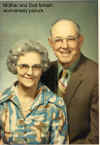 of them that are included in the
entirety in the Archives. There is a significant amount of information about
them in those documents that will not be repeated here. This effort is more
intended to focus on what kind of people and parents they were.
of them that are included in the
entirety in the Archives. There is a significant amount of information about
them in those documents that will not be repeated here. This effort is more
intended to focus on what kind of people and parents they were.
Dad was born on May 14, 1906, at his parent’s home east of Concordia. He was the eighth of nine in the family. He attended the first eight grades of school at District #8 School, which was located about one-half mile south of the Fredrickson farmstead. The brief history of District #8 School that appears in the Cloud County history is included in the Archives as is a picture taken of it in 1919. The district was organized before Charles Fredrickson moved his family to the farm east of Concordia, but, as the County history indicates, three generations of Fredrickson children were educated there. A Fredrickson child or grandchild was enrolled in the school continuously from 1908 until 1946. I was the last in that progression attending there for most of my first two grades of school before we moved to Belleville.
Dad attended high school in Concordia, but only completed the first two years. The explanation for his not having finished was always elusive. His response when asked was that he ‘had to stay home and work’, but there was never any elaboration offered or obtained as a result of further interrogation.
 It was always a question of interest to me because he had
obviously enjoyed his two years of high school a great deal. He talked about his
experiences there frequently and remembered everyone who attended at the same
time as he did, I believe. He also had a first rate mind. He could solve rather
complex mathematics problems much more rapidly in his head than I ever could on
paper, and his reading speed and comprehension were truly superior.
It was always a question of interest to me because he had
obviously enjoyed his two years of high school a great deal. He talked about his
experiences there frequently and remembered everyone who attended at the same
time as he did, I believe. He also had a first rate mind. He could solve rather
complex mathematics problems much more rapidly in his head than I ever could on
paper, and his reading speed and comprehension were truly superior.
The answer may simply be that there was not enough money available at the time to allow him to finish high school. His father’s ultimate financial failure did not occur until several years later, but the financial circumstances of the family clearly changed materially following World War I. Whatever the reason was, he never voiced bitterness nor regret about not finishing school while we were younger, as I recall. When he was much older, it became evident that there were deeper feelings of resentment and this was one of the causes.
Mother said that he had dreamed of becoming a minister as a boy and those those ambitions had vanished when he quit high school. No one could ever have questioned the sincerity of Dad’s religious convictions as a boy or a man, but he was such an unsparing critic of ministers that I could never imagine him being one. His view was that the Preacher, his unvarying reference to the incumbent, only had one job and that was to preach. That job was to take no more than 20 to 25 minutes, as sermons of any greater duration were proof positive of inadequate preparation. In addition, the Preacher had all week to prepare and, therefore, had no excuse.
Sermons were subject to attack on a variety of grounds in addition to excessive length. Dad expected to be instructed in the scriptures, inspired in his faith, and challenged intellectually. Extra credit was awarded for the effective use of humor, but excessive reliance on poems or hymns read as part of the sermon earned severe deductions – "He had all week to think of a way to say it in his own words, he didn’t have to borrow from someone else".
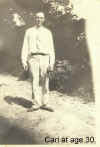 Dad had worked for his father as long as his farming operation
continued. He also worked for at least brief periods for his brothers Bill and
George and more extensively for his brother-in-law, Frank Carlson. I do not
recall his ever having mentioned working other than on the farm or for other
than members of his family. In any event, the period extending from the time he
quit high school until he started farming on his own are largely shrouded in
mystery. He was not reluctant to talk of experiences he had then, but nothing
resembling a ‘career path’ ever emerged either.
Dad had worked for his father as long as his farming operation
continued. He also worked for at least brief periods for his brothers Bill and
George and more extensively for his brother-in-law, Frank Carlson. I do not
recall his ever having mentioned working other than on the farm or for other
than members of his family. In any event, the period extending from the time he
quit high school until he started farming on his own are largely shrouded in
mystery. He was not reluctant to talk of experiences he had then, but nothing
resembling a ‘career path’ ever emerged either.
My own supposition is that he was recovering from the shock of his father’s financial reverses, and the dramatic change in his own prospects that resulted from it. I want to avoid any impression of being melodramatic regarding his reactions because he never was. The experience of watching first-hand and being directed affected by those events was certainly profound for him, however. They would be a direct influence on him all of his life and were the cause of the only mystery life presented he was never able to solve to his own satisfaction. The issue was business success.
Dad was only modestly successful as farmer-businessman. He paid his bills, provided for his family, and contributed faithfully to his church. He had started with nothing in a very dark period and had survived all of the vagaries of agriculture, but he retired from farming with a very modest accumulation. He would never own the farm he dreamed of having. Material possessions meant absolutely nothing to Mother, and I do not believe he was really haunted by the fact that he had not made much more money.
The mystification for him was simply this: How does an honest man become a success in business without relying on luck and taking risks that are unacceptably high? He had seen, smelled, and felt failure and consciously running the risk of it was beyond his comprehension. He faulted his father for having taken excessive risks and "getting involved in things he didn’t know anything about".
At the same time, he admired those who did successfully take risk. His thumbnail appraisal of them, however, was always revealing. "He’s the luckiest darned guy in the world", was a frequent summary. The notion of calculated risk was for him just that – a notion. It was the rationalization created by the gambler who was reluctant to admit he was gambling.
This conundrum for him became more obvious as his sons pursued their careers. He assumed (with some justification) that I was assuming no risk as long as I was working for a government agency. When I left Washington and took over the bank in St. Louis, he asked what the condition of the bank was. I really did know how to explain how serious the condition actually was – the board of directors could hardly fathom it and often had to be reminded again each month – and I did not want to worry him so I responded in deliberately vague terms.
I should have known better than to think such an answer would satisfy him, and it did not. When he persisted, I finally confessed that the bank was broke. Even then, I did not attempt to explain just how broke it was because he would never have understood – financial institutions with deficit capital accounts in excess of $350 million are elusive concepts. Nonetheless, his reaction was exactly as I had expected summed up completely by his question, "Didn’t you know what kind of situation you were getting yourself into?"
It was quite obvious that it was not an issue of any doubt that I had made a very bad decision. The only question was whether I had any prior notion of just how bad it might be. I explained the basis of my belief that we could dig ourselves out of the hole and expressed my conviction that one was better off taking over an operation at the bottom because things could only get better. He was unconvinced, and I am sure expected for some time to learn that we were moving to more modest circumstances.
He was even more concerned about Jan and his fertilizer manufacturing venture. He was quite certain that it would fail and that the entire family would be out in the street. I am sure I heard him say at least a half-dozen times, "I just don’t know why he would want to take a chance like that. He always had good jobs and could get another one if he wasn’t happy where he was."
He started farming in 1932 on a rented farm located about 9 miles south and west of Concordia. It is good creek bottom land but is only 80 acres. That may have been all he could have handled because I think he had only one team of mules in the beginning. It was the depth of the Great Depression nationally although it could be fairly said that the depression for agriculture began in 1920. Commodity prices had improved somewhat in the late 1920s but collapsed again to all-time lows in the 1930s. Of even greater immediate impact in the Plains was the drought that began in 1930 and continued unbroken until 1938. Some individual years were less severe than others but rainfall for the entire period was essentially at the desert level.
The winds were probably no more severe than normal, but they had a disastrous impact on soil that no structure remaining and little or no vegetation for protection. The dust storms were more severe to the south and west on the Plains, but I remember clearly people talking of sleeping night after night with wet washcloths over their faces. Dad said that, when he awoke the morning of their wedding, he could see the outline of his head in the dust that had accumulated on his pillowcase during the night.
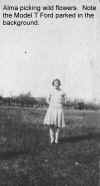 Dad and Mother were married in Concordia on March 14, 1935. As
any who knew them would expect, the courtship was not of the
Dad and Mother were married in Concordia on March 14, 1935. As
any who knew them would expect, the courtship was not of the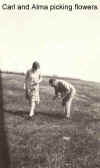 whirlwind variety.
They had been going together for nearly five years. Mother had just passed her
24th birthday, and Dad would shortly be 29. In the account of the
reception given in their honor by Grandma Buer, The Scandia Journal,
Scandia, Kansas, reported that, "They have gone to housekeeping on a farm
south of Concordia".
whirlwind variety.
They had been going together for nearly five years. Mother had just passed her
24th birthday, and Dad would shortly be 29. In the account of the
reception given in their honor by Grandma Buer, The Scandia Journal,
Scandia, Kansas, reported that, "They have gone to housekeeping on a farm
south of Concordia".
The little frame house on the place has been gone for many years now, but I can remember well driving past it on Highway # 9 on the way to Beloit and listening to them talk about living there. It clearly brought back nothing but happy memories for them. They had a number of close neighbors including an older Swedish couple living directly across the road who took an active interest in their doings and welfare. The old folks came over and checked on the newly marrieds once or twice or a day.
The old gentleman was apparently somewhat credulous and, in Mother’s estimation, Dad took excessive advantage telling him one outlandish tale after another. Dad got almost as much enjoyment out of retelling the stories as he obviously had in telling them initially. He also felt a twinge of guilt because, when Mother would express her view about his teasing, he would, somewhat defensively, hasten to remind her that "those old folks came over and cried like babies when we moved".
On one occasion, however, she responded that she did remember but that it was not clear whether they crying out of sadness or from relief. Dad loved verbal jousting and was rarely bested. However, when she fired a shot for which he had utterly no response as on this occasion, he would have the most sheepish of expressions on his face.
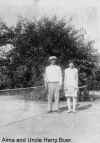 Mother was born on March 8, 1911, also the eighth in a family of
nine. She especially enjoyed the outdoors and
Mother was born on March 8, 1911, also the eighth in a family of
nine. She especially enjoyed the outdoors and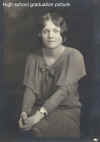 apparently spent most of her time
there with her father and brother, Harry. She loved to read and was an excellent
student in school. Latin and English were her favorite subjects, and language
was a fascination all of her life. She graduated from Norway high school in
1929, and worked as a nurse’s aid for a couple of years. She then entered
nurses training at the Concordia Baptist Hospital.
apparently spent most of her time
there with her father and brother, Harry. She loved to read and was an excellent
student in school. Latin and English were her favorite subjects, and language
was a fascination all of her life. She graduated from Norway high school in
1929, and worked as a nurse’s aid for a couple of years. She then entered
nurses training at the Concordia Baptist Hospital.
We do know how or when they met, but they began going together shortly after she moved to Concordia. According to Mother, they had had a long engagement waiting to be married "until we could afford it". It is not at all clear from this time and distance exactly what financial goal required reaching before they could marry, but I am grateful it was achieved. Knowing them as I did, I am confident, if it had not been, that this account would not require writing, and this writer would not be available to do it.
Mother was within a few weeks of graduation as a registered
nurse when she developed a serious infection in one of her legs. She 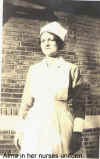 was
hospitalized for some time, and the recovery made completion of the training and
testing impossible. Obtaining the nursing certificate would require repeating
the final year of training. Dad did not want her to do so, because men with
working wives were not regarded with the same respect as other men in those
days. She acquiesced, but I believe she later came to regret having done
so. The regret had nothing to do with any additional income nursing might have
provided. I think it had much more to do with her self-image.
was
hospitalized for some time, and the recovery made completion of the training and
testing impossible. Obtaining the nursing certificate would require repeating
the final year of training. Dad did not want her to do so, because men with
working wives were not regarded with the same respect as other men in those
days. She acquiesced, but I believe she later came to regret having done
so. The regret had nothing to do with any additional income nursing might have
provided. I think it had much more to do with her self-image.
I am convinced they came closer to the ideal of marriage than any people I have known. They truly became one. The respect and love each of them had for the other never lessened. Neither of them had any illusions about human perfection, but they both believed they had found the perfect mate. In that, I think they were right.
The families from which they each came had strong mother figures, but their fathers were the heads of their households. Such would be the case in their house, as well. Easy acquiescence in authority structures of any kind was not part of my original equipment, and I spent much of my childhood and teen years plotting revolt and looking for loopholes.
It was not so much that I disliked doing what I was told to do or that I wanted particularly to do what was foreclosed to me. It was simply that I did not want to be told what to do or not do. Only years later as a father myself did I come to understand that only in this way can the accumulated wisdom and culture of the ages be passed along and civilization itself be preserved.
When I was three, we lived on a farm east of Concordia to which
the folks had moved about the time I was born. The yard was along the Missouri
Pacific railroad tracks and, the trains were the first machinery that was an
irresistible attraction to me. I had begun to disregard the orders to stay close
to the house and never go up the driveway toward the tracks. In response, Dad
brought home a role of wire netting and strung it around the area of the yard
close to the house. One of my most vivid memories of early childhood is that of
Dad confidently assuring Mother upon completion of the fencing project that
"he won’t get out here". If there had been any doubt that I would
attempt to break out, the smug look on his face resolved it.
along the Missouri
Pacific railroad tracks and, the trains were the first machinery that was an
irresistible attraction to me. I had begun to disregard the orders to stay close
to the house and never go up the driveway toward the tracks. In response, Dad
brought home a role of wire netting and strung it around the area of the yard
close to the house. One of my most vivid memories of early childhood is that of
Dad confidently assuring Mother upon completion of the fencing project that
"he won’t get out here". If there had been any doubt that I would
attempt to break out, the smug look on his face resolved it.
I do not know how high the fence was, but it was much taller than I. However, the next day as soon as I heard the train, I went over the top and headed for the tracks. I almost made it, but Mother heard the train also. She also headed for the tracks, but she came with the yardstick. She whacked me at least once every step of the way back and then more as I was required to climb back over the fence. Years later, after the pain had subsided, I reminded her of the incident and inquired if she were not, at least, a little regretful. She firmly denied any second thoughts and said, firmly and factually, "You didn’t go back to the railroad tracks anymore".
It is the only spanking I can recall her having given me. Dad was the disciplinarian, and he did on occasion spank us. It was highly infrequent, however and we deserved it far more often. His preferred punishment was the ‘royal chewing out’. Spanking would often have been less onerous and unpleasant.
It would not appropriate, however, to dwell too heavily on punishment because both Mother and Dad were very tolerant parents. They took no pleasure in punishing us even when that tolerance had been seriously abused. They were parents from an ancient school of parenting. They believed their duty was to nurture responsible and principled offspring, and that the only way that could be done was by setting the proper example.
By the time I was 14, I knew that I had a much better and clearer understanding of the world that my father did and was assiduous in ignoring all that he had to say as long as possible. He did succeed in shocking me to attention once at about that time, however when he told me that he thought parents were finished with the job of raising their children, for better or worse, when they reached the age of 14. He said, "You’ll have to learn the rest of what you’ll need to know for yourself". Freedom and independence never again had quite the same magic allure.
Dad was a perfectionist of the first order. Doing something the way it should be done was of much greater importance than getting it done. Even the job of cleaning the chicken house had to be done and completed in a neat and thoroughgoing fashion. That no one else in the world would ever look in his chicken house or judge how it had been cleaned if they had looked mattered not in the least to him. Nor did the fact that the stupid birds were utterly oblivious to whether their shelter were freshly cleaned or otherwise and would immediately set out to undo what had be done.
No job on the farm stimulated his perfectionism as keenly as planting corn. The rows had to be absolutely straight. It was as if corn would not grow in less than perfect rows. Nothing would get a more immediate reaction from him when he was planting than an observation from one of his sons that "it looked like you might have dozed off out there". There were very things about which we could not and did not joke, but straight rows were too important for that.
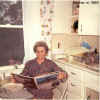 Mother was always thought herself to be an extremely shy person
and uncomfortable in large groups or with people with whom she was not well
acquainted. There was some truth in that but less I think than she believed. She
was certainly not as at ease with people as was Dad, but no one else was either.
She was involved a wide variety of activities and was typically in a leadership
role. I am quite sure that she never sought any of those responsibilities, but I
am equally certain she never refused any either.
Mother was always thought herself to be an extremely shy person
and uncomfortable in large groups or with people with whom she was not well
acquainted. There was some truth in that but less I think than she believed. She
was certainly not as at ease with people as was Dad, but no one else was either.
She was involved a wide variety of activities and was typically in a leadership
role. I am quite sure that she never sought any of those responsibilities, but I
am equally certain she never refused any either.
She was particularly active in church and Sunday school and the 4-H club. There were very few jobs in either one she did not do at some time or another.
Mother had a remarkable knowledge of the Scriptures. We would at times attempt to stump her with questions, but we rarely succeeded. When we were about ten and twelve, we were a part of the Youth Fellowship group that met for an hour on Sunday evening before the evening worship service. The youth in the church available for participation were few in number and the church administration broadened the criteria for inclusion until a larger but hardly youthful group regularly attended.
At some point, as it always does in Baptist circles, the desirability of enhancing the young people’s knowledge of the Scriptures became manifest. A novel new approach had presented itself in the form of a Bible quiz. There was a large set of cards each with a question about some person, place, circumstance, or concept taken from the Scriptures. It became the practice to close each Sunday evening session with a few rounds of questions.
Those of us who were chronologically eligible for the Baptist Youth Fellowship hated the quiz business. We rarely knew the answers to any of the questions, and we were not going to get sucked in that easily, in any event. The group of ringers that attended loved it, however.
Mother’s encyclopedic knowledge was quickly evident and questions that no one else could answer were referred to her. She was rarely even hesitant and even more rarely wrong. This did not escape our attention, of course. Along with a couple of the other young stalwarts, we conceived the notion of an entire Sunday evening session devoted to a one-on-one, winner take all, showdown quiz contest between Mother and the Preacher.
Neither of the putative contestants was in the least inclined. Mother was most uncomfortable with prospect of being the center of attention and even more so with the presumptuousness of pretending to superior knowledge of the Holy Scriptures. For his part, the Preacher could see nothing but downside in it for him. But we persisted putting heavy emphasis on what a powerful example and inspiration this would be for the young people. We succeeded in getting broader support, and, finally, it was agreed that the quiz contest would take place.
The contest was, in fact, an anticlimax. While the Preacher, having obtained his theological credentials from a correspondence school, was probably overmatched from the outset, he was fortunate he was not at the blackjack table in Las Vegas that Sunday night. He drew every obscure question in the deck and missed three or four out of the first six. Mother, meanwhile, ran the first 28 questions without a miss, if memory serves me correctly. She won going away.
Mother was clearly embarrassed, but Dad was thrilled by her triumph. Then, to her horror, he announced to us that she had exposed the Preacher as being unqualified for his post thus confirming the suspicion he had had from the first time he laid eyes on the man.
Belleville was a completely new community to both Mother and Dad. Neither of them had ever lived there, and it was not Baptist nor Lutheran, not Norwegian nor Swedish. It was clearly a liberating experience for Dad. He knew everyone in town and for miles around in short order. Mother did not adapt as quickly as did he, but she came to enjoy the place as much he did in time.
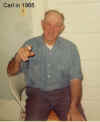 Dad had a truly extraordinary sense of fun. He loved to tease
and laugh and enjoyed the jokes others pulled on him as much as those he
perpetrated. There is literally an endless number that could be told, but I will
limit myself to two. One of his special buddies was a farmer from near Republic
who was the chairman of the Republic County Farm Bureau for a time. They could
not be in close proximity without some raucous frivolity breaking out, usually
at the expense of some innocent third party bystander.
Dad had a truly extraordinary sense of fun. He loved to tease
and laugh and enjoyed the jokes others pulled on him as much as those he
perpetrated. There is literally an endless number that could be told, but I will
limit myself to two. One of his special buddies was a farmer from near Republic
who was the chairman of the Republic County Farm Bureau for a time. They could
not be in close proximity without some raucous frivolity breaking out, usually
at the expense of some innocent third party bystander.
Membership in the Farm Bureau was maintained by the annual collection of dues accomplished by on-farm visits by volunteer members organized by township captains. The township team and its captain that had achieved the best results in the county were recognized at the county annual meeting. Dad and his kindred spirit were discussing the prospects of this ceremony at the upcoming meeting that his friend would chair. They were bemoaning the fact that the winning captain, whomever he turned out to be, would get up, utter the same old platitudes regarding commitment, teamwork and the Farm Bureau way, and thank all his volunteers before sitting down to the great relief of the entire assembly.
They began to fantasize about a really imaginative winning captain’s report. Before they got done, it was agreed that Dad would be introduced as the captain of the winning township team to give a mock report as entertainment. He was to wear an old tie that would be cut off by the chairman as the termination of his ‘report’.
Dad was introduced by the chairman as the captain of the winning team and proceeded to deliver a report of incredible accomplishment resulting almost entirely from his personal efforts. He questioned the effort of the other teams and the integrity of the results they reported. He closed by offering to come and help those elsewhere in the county who most needed it the next year.
Dad said later that there were too many in the crowd who were taking it entirely too seriously and that he thought the chairman would never come with the scissors. He said, "I asked that clown afterwards what he was waiting on. I thought I was going to get killed up there. And he said he wanted to see just how far I would actually go".
It must have been a memorable performance because I heard about it years later from farmers who had been there. One of them said, "I was sitting right up front where I could see, and your Dad never cracked a smile. I thought he was serious right up to the end."
The second of the two stories is not as hilarious now in a society in which violence is so prevalent as it was in the more innocent time when it occurred. Jan and I had a large arsenal of play guns of all types at all times. The finest of this collection were two "Smoker 45s". They were made of cast aluminum of a size, weight, and color that made them very realistic. The name "Smoker" derived from the fact that they would produce a puff of smoke when the trigger was pulled if special power (or flour when the special power was exhausted) was put into the muzzle.
One of these weapons had been left in the back seat of the car one day when Dad was on his way to the Co-op station in town to pick up some feed. He had noticed the gun and on the way his imagination took flight. When he arrived at the station, he took the gun, twisted his cap off to one side of his head, put his most crazed expression on his face, and entered the station brandishing the gun, demanding all the money, and threatening to shoot anybody that moved. The impact was apparently exactly what one would expect with all hands diving for cover. One of the staff ended up on top of a pile of feed sacks where he could never have gotten under ordinary circumstances. A ladder was required for him to get back down.
Fortunately, it was then and not now. It was taken as a crazy but harmless and innocent joke. There were no arrests and no lawsuits and even the victims laughed about it for years thereafter. Fortunately also, the Belleville Police Force was not nearby. They would have succumbed to panic and shot themselves and all innocent bystanders.
What did they give us? My answer to that question is that they equipped us to face the world more confidently than either of them was able to do. We understood that truth and honesty and taking responsibility for one’s self is the basis for the only kind of success that really counts. We learned that life is to work in and to have fun in and that the two must not be exclusive. We were exposed to the reality that there is good black dirt and there is also gumbo to be plowed in every round. One cannot imagine a richer inheritance.
History Charles Christine Amelia Edmund Archives Genealogy